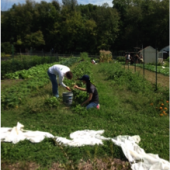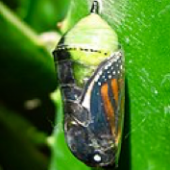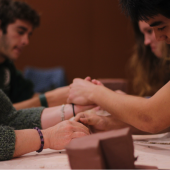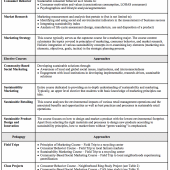
Abstract: Students are transformed when they realize that their theory-based actions have real and meaningful impact. Student learning outcomes are enhanced when they realize this impact. This is important, because the topic of sustainability involves a huge amount of grim data about the state of the planet and our impending demise; and an urgent call for action to make positive impact. To enable my MBA students to take action, I designed an experiential, action-research and transformational pedagogical approach; and a mixed-methods study to assess if/ how students engaged with, and learned or cared about sustainability when it was delivered at the level of personal impact and personal action. I found that making sustainability personal did not cause alienation, but did significantly contribute to learning and caring in all students in the course. However, students’ comfort with uncertainty moderated their perceptions of learning, which provides insight for how to improve the course in the future.
Continue Reading
Abstract: Household composting is a practical sustainable behavior which should be further investigated. The Short Composting Survey was developed for use during the Compost Project pilot study to measure the knowledge, values, barriers, and social norms surrounding composting (n=25). The purpose of this research was to describe the testing and refining of the survey tool for the pilot study. Statistical analyses included calculating the Index of Item-Objective Congruence (IIOC) values and conducting a confirmatory factor analysis following administration of the survey. Nine respondents assisted with survey tool development by completing the IIOC, and values ranged from 0.29 to 0.66 which indicated that all of the survey questions matched more than one construct. The factor analysis resulted in a three-factor solution with a cumulative loading of 71.2%, meaning that these identified factors contributed 71.2% of the variance in responses. Factor 1 (“Values”) proved to be the strongest factor, explaining 36.6% of the variance, whereas Factor 2 (“Social Norms”) explained 20.04%, and Factor 3 (“Barriers”) had 14.6%. This survey may be useful for future food composting and sustainability-related research efforts.
Continue Reading
Abstract: This paper describes and explains findings from an exploratory, interpretative qualitative case study that examined how a residential graduate program in science education, based in a wilderness area, supported the development of citizen educators. Data collection over a three-year period included 16 in-depth interviews with administrators, faculty, and graduate students; observations of class activities and campus community meetings; and document analysis of curriculum materials. Analysis of the data revealed how the culture of the campus community encouraged students to become citizen educators.
Continue Reading
Abstract: Campus agriculture projects are increasingly being recognized as spaces impactful to student engagement and learning through curricular and co-curricular programming; however, most campus farm activities are limited to agriculture or sustainability programs and/or co-curricular student clubs. Thus, campus farms are largely underutilized in the undergraduate curriculum, marking a need to explore the efficacy and impact of engaging a diverse array of disciplinary courses in the rich social, environmental, and civic context of local sustainable agriculture. The Farm Hub program presented here incentivizes instructors to refocus a portion of existing course content around the topic of local, sustainable agriculture, and reduces barriers to using a campus farm as a situated learning context for curricula. A pedagogical framework founded in place-based experiential learning (PBEL) theory was developed to guide instructors in the development and implementation of 4–6-week inquiry-based PBEL modules embedded in existing courses. The framework was converted into a research protocol to quantify program implementation fidelity and PBEL best practice adherence for the proposed lesson plans (intended) and their implementation (applied). The framework enables the development of a cohesive cross-curricular program so that the impact of implementation fidelity and best practice adherence to student learning outcomes in scientific literacy, place attachment and meaning, and civic mindedness can be assessed and the results utilized to develop a formal farm-situated PBEL pedagogical taxonomy. This framework can be applied to PBEL curriculum in natural spaces beyond campus farms.
Continue Reading
Abstract: Although the Decade of Education for Sustainable Development (2005–2014) was a period of rapid pedagogical revitalization and innovation, much sustainability education today is still delivered using transmissive and instrumental pedagogies common across higher education. Now that the field has integrated many of the insights from the decade, students and facilitators should continue innovating along themes consistent with the goals of sustainability: transformation and emancipation. Yet, more clarity is needed about pedagogical approaches that will transform and emancipate students, allowing them to become innovators that change existing structures and systems. This paper presents a framework combining four interacting (i.e., complementary) pedagogies (transmissive, transformative, instrumental, and emancipatory) in sustainability education, helping to reify pedagogical concepts, rebel against outdated curricula, and orient facilitators/learners on their journey toward transformative and emancipatory learning. The authors begin by reviewing the evolution of sustainability education and transformative learning theory prior to introducing the framework. The paper concludes with a vision of sustainability education that incorporates contemplative pedagogies as essential methods in a field in need of cultivating hope, resilience, and emergence.
Continue ReadingAbstract: With apparel and textile production finding itself a leader in social and environmental responsibility issues, the call to action to influence purchase intention for sustainable and responsible apparel is necessary to both the environment and humankind. Literature supports the connection between consumer knowledge of social issues within the apparel and textile industry and purchase behavior. Cowan and Kinley (2014) identify attitudes as the strongest predictor for purchasing environmentally sustainable apparel. This study looks at the interjection of a type of popular and accepted medium, film, as a possible catalyst to knowledge and attitude change in millennial consumers regarding responsible apparel. This is an exploratory quantitative research study to explore possible future directions of how to impact sustainable purchase intentions of millennials in a consumer driven society. A total of 128 participants from a large Midwest university took part in the study during spring and fall 2016. This study found that millennial consumers had significant change in their purchasing behavior regarding responsible apparel. They also considered themselves more knowledgeable regarding the topic. However, their change in attitudes was not towards being more concerned with what was happening in the industry nor their willingness to sacrifice price and style for responsible apparel.
Continue ReadingAbstract: The author examines the role and influence of a place-based Environmental Literature and Writing class on her undergraduate students’ perception of their personal position within their immediate and extended environments. Further, the author aims at gaining a better understanding of what course elements the students found particularly valuable and effective in the realization of their agency within our environmental context, and what role writing played in the students’ reflections and examinations of the complex relationships between self, nature, and matters pertaining to sustainability and the future of our natural habitats. By assessing student writing, collecting questionnaires, and conducting open-question interviews, the author explores her students’ impressions and experiences of navigating global and local environmental issues through a Humanities-based course.
Continue Reading
Abstract: This article describes an innovative, grant-funded symposium for creative social stewardship that sought to blend the triad of art, education, and the natural environment through a focus on socio-cultural sustainability and community engagement. The purpose of this article is to share foundational information related to the origins of the symposium, describe the tenants of community arts initiatives, feature a session snapshot, and discuss the value of creative social stewardship as a part of daily practice. We conclude by making recommendations for future endeavors in cultivating creative social stewardship conferences or initiatives, ultimately promoting the idea that collaborative, community-based and arts-focused events might inspire reflection on connection, nature, and creativity in ways that nurture sustainability.
Continue Reading
Abstract: As noted by a growing number of marketing scholars, the importance of educating marketing students on sustainability should be an important objective for marketing educators and business schools alike. The focus of sustainability-based marketing education is on the greater good of the environment and society, while adjusting internal and related external processes to sustainability principles. In this conceptual paper, we adopt a broadened definition of sustainability distinct from the narrow understanding of Corporate Social Responsibility (CSR) adopted by the business world in general and make recommendations for using this broadened definition to reframe marketing curricula and pedagogy. We give specific examples of assignments and pedagogical approaches for four core marketing courses as well as four marketing electives. By doing so, we hope to foster a new marketing mindset and a new generation of marketing practitioners who embrace, internalize, and practice sustainability holistically.
Continue Reading